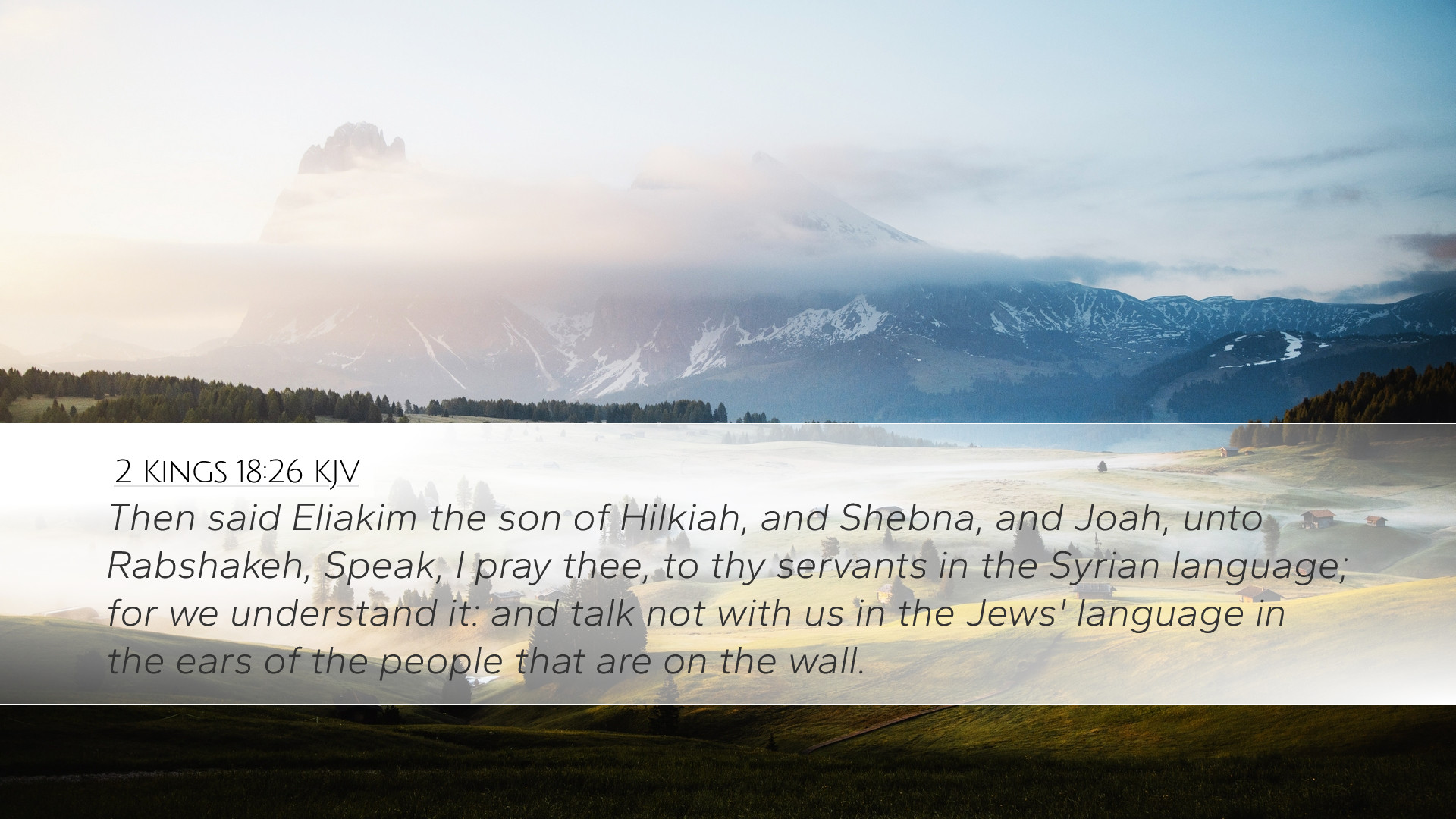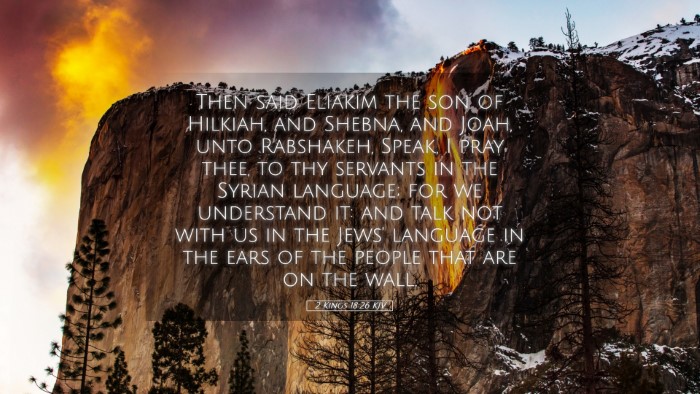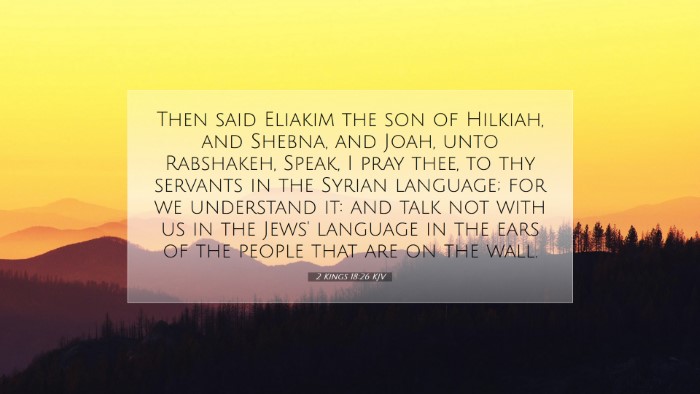Commentary on 2 Kings 18:26
Verse: "Then said Eliakim the son of Hilkiah, and Shebna, and Joah, unto Rabshakeh, Speak, I pray thee, to thy servants in the Syrian language; for we understand it: and talk not with us in the Jews' language, in the ears of the people that are on the wall."
Introduction
The passage of 2 Kings 18:26 introduces a crucial moment during the Assyrian siege of Jerusalem, where Eliakim, Shebna, and Joah confront Rabshakeh, an Assyrian military official. The plea to speak in the Syrian language indicates a desire to protect the morale of the people and the sanctity of their discussions. This moment is pivotal both politically and theologically, as it reflects the tension between the Israelite faith and the encroaching Assyrian power.
Contextual Background
To fully grasp the urgency of Eliakim's request, we must consider the historical context. The reign of King Hezekiah marked a significant period of reform in Judah, including the destruction of idols and a revival of worship at the Temple in Jerusalem. The Assyrian Empire, under King Sennacherib, was notorious for its brutality and siege warfare, posing an existential threat to the smaller kingdoms of Israel and Judah.
Political Significance
The act of requesting that Rabshakeh speak in a language that the common soldiers and citizens would not understand is an effort to maintain the dignity of Judah in the face of intimidation. This interconnectedness of language and identity highlights the importance of societal cohesion during times of crisis.
Theological Implications
This request can also be viewed from a theological standpoint. The leaders of Judah are implicitly recognizing their dependence on God's intervention. By not wanting the common people to hear the threats being made in their own language, they are also attempting to shield them from despair and maintain their faith in Yahweh as their protector.
Commentary Insights
Matthew Henry's Commentary
Matthew Henry emphasizes the importance of communication in crisis. He notes that Eliakim and his companions understood that the threats from Rabshakeh were designed not only to intimidate but to sow discord among the people of Judah. By asking for a private conversation, they sought to prevent panic and maintain unity, which might be instrumental in their reliance on God's deliverance.
Albert Barnes' Commentary
Albert Barnes provides a detailed account of the Assyrian's intimidation tactics. He notes that Rabshakeh was likely aware of the psychological impact his words would have on the people listening from the wall. Barnes reflects on the significance of language as a tool of power and a means of controlling the narrative. The leaders’ request indicates their desire to protect their people from unnecessary fear and encourage them to remain steadfast in their faith.
Adam Clarke's Commentary
Adam Clarke elaborates on the cultural implications of this verse. He points out that Eliakim and his colleagues’ request reveals an understanding of the socio-political landscape of their time. Their plea to Rabshakeh to speak in Syrian reflects a strategic and prudent approach to warfare. Clarke also notes the subtleties of fear and faith working together in this exchange, as the leaders balanced their need to confront the enemy with the necessity of preserving hope among the people.
The Language of Power
This moment in 2 Kings 18:26 serves as a microcosm of the larger narrative of the struggle between faith and worldly power. The use of language as a means of influence is a recurring theme throughout the scriptures.
- The Role of Language: Language is powerful; it conveys not only information but also emotion and authority. The leaders of Judah understood the potential impact of Rabshakeh’s words on the psychological state of their people.
- The Importance of Shielding the Vulnerable: Eliakim and his companions demonstrated a protective leadership style that sought to shield the vulnerable from despair. This reflects a core aspect of pastoral care in times of distress.
Applications for Today
Pastors, theologians, and students of the Bible can draw several significant applications from this passage:
- Leadership in Crisis: Effective leadership often requires protecting those one leads from unnecessary distress while also being frank about dangers. The balance between truth and hope is essential.
- Language as a Tool: The intentional use of language in ministry can either build up or tear down. Leaders must be mindful of how they communicate threats or challenges to their communities.
- Faith Amidst Fear: The plea to speak in a different language illustrates the notion of cultivating faith within a fearful environment. Church leaders today must encourage their congregations to focus on God's promises, especially in tumultuous times.
Conclusion
2 Kings 18:26 is steeped in rich historical, political, and theological significance. The leaders of Judah's interaction with Rabshakeh reveals the multifaceted nature of crisis communication—a blend of prudence, protection, and the pursuit of maintaining hope. In reflecting on this commentary, modern-day leaders and scholars can learn valuable lessons about the complexities of leadership, the power of language, and the enduring importance of faith amid fear.


